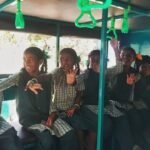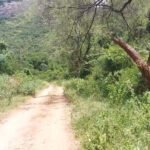Read in : தமிழ்
Hill tribes, the original residents of the land, are distanced from mainstream society but they too yearn for development in terms of education.
In a humanitarian gesture to mitigate tribal school children’s transport woes, the Tamil Nadu Forest Department has taken the initiative to transport them back and forth from the Old Sarkarpathy-II tribal settlement on the fringes of the Anamalai Tiger Reserve (ATR) falling under Coimbatore district. There are more tribal areas including Old Sarkarpathy-II, Sarkarpathy 1, Kozhigamuthy, Nagaroothupathy in the ATR.
 The electric-operated vehicle picks up the children at 8 a.m. and transports them to their school, a distance of 12 k.m. Again, it picks them up around 4.30 p.m. and drops them back at home. This new service by the Forest Department has allayed the school children’s fears over animal movements in the evening and strengthened their resolve to pursue education, tribal villagers and officials say.
The electric-operated vehicle picks up the children at 8 a.m. and transports them to their school, a distance of 12 k.m. Again, it picks them up around 4.30 p.m. and drops them back at home. This new service by the Forest Department has allayed the school children’s fears over animal movements in the evening and strengthened their resolve to pursue education, tribal villagers and officials say.
About 30 students of Classes 8, 9 and 10 from Old Sarkarpathy-II that is home to 200 families used to earlier walk to their panchayat higher secondary school. They made the fear-filled trek for the past 20 years. Since the return trip on foot was highly risky for the children, in view of ferocious animals getting active in the evening, the villagers would go in groups down the hill and bring back their children.
The electric vehicle picks up the tribal children at 8 a.m. and transports them to their school, covering a distance of 12 k.m. Again, it picks up them around 4.30 p.m. and drops them back at home
Also Read:
Mahabalipuram’s shores come alive with music at the Irulars’ full moon festival
Meet the Hakki Pikkis on the fringes. Btw, they are not Kuravars
Representations made to the forest officials did not yield results in the past. But, in deference to their appeals, transport facility for the children arrived on June 15, 2022, thanks to the efforts of Forest Officer Pughazhenthi, who made it possible through ATR Assistant Director Ganesan, the grateful villagers say.
Also helps the sick
 Moopan, an elder among the hill tribal people, said that the department’s move put an end to years of official apathy. The transport facility for school-bound children was helping their education. Moreover, it would also be useful for transporting sick people downhill to the hospital, he said.
Moopan, an elder among the hill tribal people, said that the department’s move put an end to years of official apathy. The transport facility for school-bound children was helping their education. Moreover, it would also be useful for transporting sick people downhill to the hospital, he said.
Acknowledging that the village has electricity and drinking water, Moopan, said the long-pending demand for toilet facilities was, however, yet to be fulfilled. While men could boldly go into the forest areas, women and children were afraid because of man-animal conflict, he said. The government should fulfil this requirement for toilets early, he appealed.
Anamalai Tiger Reserve Assistant Director Ganesan said, “The transport facility provided by our department to the hill tribal children is the first of its kind. No such facility has been created for other hill tribes spread over 30 districts in Tamil Nadu. The children from Old Sarkarpathy, a hill tribal village, used to go to school on foot, traversing 12 k.m. This was worrying us and spurred us to act. With the help of volunteer organisations and with the District Collector’s permission, we created this vehicle facility. It has elicited a good response and we plan to introduce four and five more vehicles.”
Besides, various initiatives are taken to make the most of the skills of tribal people and enable them to hike their earnings. They are trained in producing handicraft articles, weaving baskets and mats and creating ornamental materials and maps, he said.
This new service by the Forest Department has allayed the school children’s fears over animal movements in the evening
In the Western Ghats adjoining Coimbatore district, there are people of several hill tribes such as Irular, Malasar, Kaadar, Malamalasar, Pathi Malasar and Adhi Vedan. These tribes are, in fact, aboriginal, living in clusters comprising about 20 to 200 families.
It is a startling fact that several such tribal regions are yet to get electricity, residential facilities and full supply of essential commodities.
According to data, the 30 districts in Tamil Nadu have their own specific tribes living in hill ranges. Their lifestyle is far removed from that of urbanised communities, and they seem to be cut off from those “modern” trends, living as they do on mountains at a height of up to 2,500 metres. Governments have been keen to cater to them through two exclusive departments: the Social Welfare Department and Adi Dravidar Welfare Department. Boarding schools, primary schools, kids’ schools and panchayat higher secondary schools have been set up to provide the tribal children education on a par with that of their counterparts in towns and villages in the plains.
The government has, so far, worked to improve the lot of the Tamil Nadu tribes by providing all necessary facilities. Yet, there is a long way to go for some tribal regions which continue to struggle without basic amenities such as electricity, transport and toilets. They continue to wait for solutions.
Read in : தமிழ்











